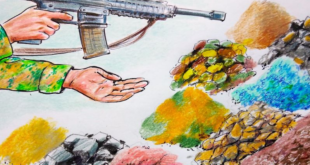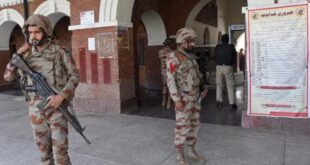The threat of violent extremists attacking the United States or allies from Afghanistan has been greatly reduced over the past 20 years, and any remaining threat emanating from the country can be addressed without a persistent U.S. military presence there, DOD officials told the House Armed Services Committee today.
President Joe Biden announced April 14 that all U.S. troops will be out of Afghanistan by September 11, 2021, the twentieth anniversary of the attack on the United States that the al-Qaida terror group planned and trained for from safe havens in Afghanistan. That attack killed 2,977 innocent people in New York, Virginia and Pennsylvania. More than 6,000 were injured.
David F. Helvey, acting assistant secretary of defense for Indo-Pacific security affairs, and Marine Corps Brig. Gen. Matthew G. Trollinger, deputy director for politico-military affairs for the Joint Staff, discussed the situation in Afghanistan, the retrograde movement of U.S. forces from the country and what the future relationship with the government will look like during their House testimony.
That Afghanistan is still a dangerous place was immediately apparent when Helvey started his testimony by condemning the attack on a girls high school in Kabul on Saturday. News reports place the death toll at 85 — mostly girls — and Helvey said it looked like the work of ISIS-Khorasan Province. “This horrific event highlights the importance of our continued support to our Afghan partners as they combat terrorist threats across Afghanistan,” he said.
While the U.S. will not have troops based in Afghanistan, the nation will “maintain counterterrorism capabilities in the region sufficient to ensure that Afghanistan cannot again become a safe haven for terrorists who threaten our security,” Helvey said.
“In this context, and in coordination with our Afghan and international partners, we’re working to reposition our counterterrorism capabilities, including by retaining assets in the region to prevent the emergence of a terrorist threat against the United States homeland from Afghanistan, and to hold the Taliban to its commitments to ensure that al-Qaida does not once again gain a foothold.”
The threat landscape has changed and the United States will adjust its counterterrorism strategy to deal with these threats.
Helvey said it is helpful to visualize the U.S. effort as three concentric rings. The innermost ring is “what we have in Afghanistan, and in the work that we would continue to do, through a diplomatic presence with our Afghan partners, to be able to help to manage and mitigate the threat of terrorism that can emanate from Afghanistan,” he said.
The second ring is America’s regional military presence. The United States military has robust capabilities in the Middle East and Persian Gulf, and those forces are not going away. “We’ll still have the ability to prosecute terrorism from positions around the region,” he said.
The acting assistant secretary would like to have forces closer to Afghanistan and said there are discussions with nations in the region.
“The third ring is globally and how we manage transnational threats globally,” he said. “We’ve learned a lot over the past 20 years in how to address transnational terrorist threats, and we’ve developed means across the government and as a nation and with our allies and our partners to cooperatively address and mitigate and reduce the danger of terrorist threats against the United States.”
The United States will continue to fund key Afghan capabilities, Helvey said. This includes sustaining the Afghan military and police forces, the Afghan Air Force and certain critical military supplies.
“Although we’re withdrawing U.S. forces from Afghanistan, we are standing squarely with our Afghan partners and redoubling our diplomatic efforts to achieve a lasting peace,” he said. “Afghan forces are performing heroically against a relentless adversary. The Afghan army takes heavy losses daily, but they remain in the fight. And they’re an institution of which the Afghan people can be proud.”
 Eurasia Press & News
Eurasia Press & News



